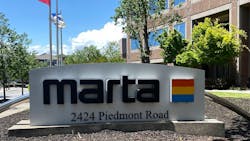USDOT awards MARTA $1.75 million in funding for TOD accelerator
The U.S. Department of Transportation (USDOT) has awarded the Metropolitan Atlanta Rapid Transit Authority (MARTA) $1.75 million in funding to raise a transit and transit-oriented development (TOD) accelerator to close capital funding gaps for projects across the region.
MARTA’s primary source of funding is the sales tax revenue collected in Fulton, DeKalb and Clayton counties and the city of Atlanta. Combined with fare revenue and federal funding, the sources allow MARTA to operate and maintain its current system but additional funding is necessary to meet all the transit expansion needs of the growing region. The city of Atlanta levied an additional half-penny in 2016, which is projected to generate $3 billion.
With the grant, MARTA plans to work in partnership with the Georgia Department of Transportation to explore and validate the property value increase resulting from transit investment can finance a project. Access to such new revenue will potentially unlock additional public-private partnerships and the ability to secure Transportation Infrastructure Finance and Innovation Act (TIFIA) loans.
“From Georgia 400 bus rapid transit, to Roosevelt Highway and rail infill stations in between, the transit needs of this region are far greater than our current funding model supports,” said MARTA General Manager and CEO Collie Greenwood. “I’m thrilled MARTA will be able to form a dedicated team to work alongside the traditional funding teams to coordinate with regional partners and USDOT to solve funding gaps for transit and TOD projects.”
The accelerator will help MARTA build on its track record of solutions to funding gaps such as its public-private partnerships with Morgan Stanley and Goldman Sachs in providing affordable housing near transit. Similarly, the accelerator will seek other capital partnerships and funding sources to support TOD.
As part of the Infrastructure Investment and Jobs Act and administered by the Build America Bureau, the Regional Infrastructure Accelerators Program aims to accelerate project delivery and clear barriers for credit-worthy projects by funding and encouraging best practices.
